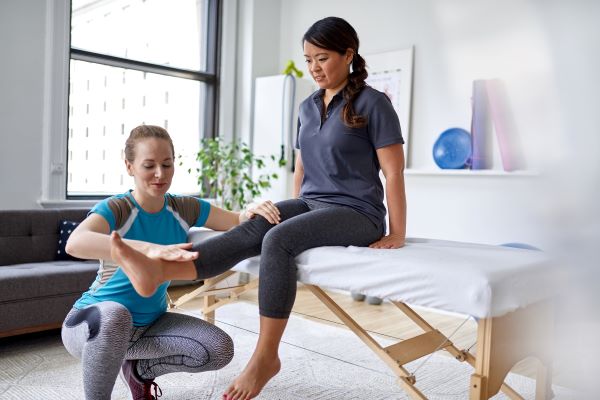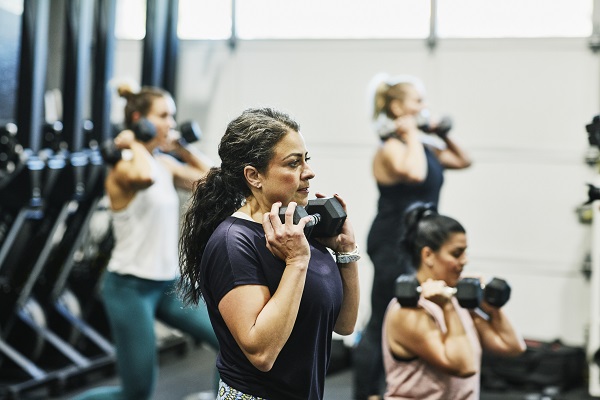-
When you hear “physio”, what comes to mind? A bad ankle? A sore back after too many hours at your desk? Maybe that nagging knee pain from your netball days? Sure, physios are experts at injury recovery, but physiotherapy is also about prevention and keeping your body strong for the long run.
So, what does a physiotherapist do?
“I describe a physio to my young patients as a body detective,” says Melbourne based physiotherapist, Charissa Fermelis. Physiotherapists are trained to assess how your body moves and identify areas that need support.
Your first session usually starts with questions. “How you’re feeling. How you move. What your goals are,” explains Fermelis. Then comes a series of clinical assessments. “We conduct a battery of tests grounded in science and evidence,” she says. “Then we come up with a plan, whether that’s solving a problem or helping someone reach their goals.”
READ MORE: Physio, chiro or osteo – what’s the difference?
Tools of the physio trade
Physios use a wide range of techniques: hands-on treatment like massage or dry needling, education, movement retraining, and tailored exercise programs. One key tool is clinical exercise, which unlike a regular gym routine, is designed around the individual’s needs and areas of concern. “Take a netball player who’s rolled their ankle,” says Fermelis. “They might want to return in time for finals. Our job is to assess where they’re at now and create a plan to get them there.”
When to see a physio?
Fermelis says more people are taking a proactive approach to their health. “We’re trying to solve problems before they become problems,” she says. And when it comes to our bodies, that’s a smart move. Here are some reasons to see a physio, even if you’re feeling fine:
Getting exercise ready
Planning to get back into exercise after it’s been a while? Great! But if your body isn’t prepared, injuries can happen. A physio can assess your baseline strength, flexibility, and movement patterns, then tailor a plan to help you move well and stay injury-free.
Ageing well and preventing falls
Falls can have serious consequences as we age. “The nuance between someone falling over and someone having a fall is quite big,” says Fermelis. Deconditioning and reduced reaction time are common causes. “It’s not uncommon for an otherwise well person to fall, break a hip, and never return home.” Physios can reduce that risk through strength and balance training.
Postpartum recovery and conditioning
Whether you’ve just had a baby or it’s been years, returning to exercise postpartum can be challenging. Physios, especially those trained in women’s health, can assess pelvic floor function and abdominal separation, and prescribe safe, effective exercises. It’s not about bouncing back, it’s about building a strong, supported foundation.
Posture and breathing
Is your body stuck in desk mode? Tight hips, rounded shoulders and shallow breathing? “Our posture is really just an accumulation of what we’ve done to our bodies over time,” says Fermelis. Physios can assess posture, breathing mechanics, and movement patterns, then offer strategies to help, even if you’re in a sedentary job. “There’s no one size fits all perfect posture,” she adds. Instead, physios help you build strength and resilience for your lifestyle.
READ MORE: Stretches for office workers
Supporting growing bodies
“We’re seeing a lot more young patients, primary school aged, coming in with no real injury”, says Fermelis. “Parents just want to check, is this normal? They may have noticed their child running differently in the playground or struggling with coordination.” Physios can help spot and support developmental issues early, keeping kids active and confident in sport and play.
It’s not just about avoiding injury, it’s about living better
Physio isn’t only for treating pain, it’s about moving with knowledge, confidence, and ease. “If we can keep people out of hospital, in their home, and active in their community, that’s the bigger picture,” says Fermelis. From active grandparents to young athletes, weekend walking warriors to new mums, physiotherapy can help support people through all of life’s stages.
Why you should see a physio (even when you’re not injured)


Stretch your extras further.
With over 550 Members’ Choice Advantage physio provider practices Australia wide, our Members’ Choice Advantage physiotherapy network generally offers members greater value from their Extras cover, with capped fees to help reduce out-of-pocket expenses*~
Charissa Fermelis is Principal Physiotherapist and Director of Grounded Movement in Melbourne.
-
How to choose and fit the right sports bra
Professor Deirdre McGhee’s expert advice on how to find your perfect fit.
-
Why more women are embracing strength training (and why you should too)
Strength training for women has many physical and mental health benefits, from strengthening bones to burning calories. Learn what they are, and how to get started.
-
Yoga and Pilates are for men too
Yoga and Pilates are for men, too. Pilates instructor Anthony Lett shares the health benefits of stretching for men.
-
7 ways walking boosts your health
Walking is a fantastic way to improve your mental and physical health, including your risk of heart disease and type 2 diabetes. Read more about the benefits, and how to get started.
-
Can walking be as good as a run?
Walking has many health benefits but is it as good as running? Read more about the health benefits of walking, how it compares to running, and how to walk properly.
-
How to walk 10,000 steps
How long does it really take to walk 10,000 steps? It may not be as hard as you think!
Things you should know
*Waiting periods apply.
~Members' Choice providers are not available in all areas and may change without notice.





